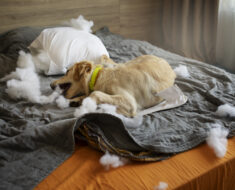Is your dog constantly scratching his bed? This common behavior can be puzzling for pet owners, but it is often linked to a variety of natural instincts and comfort-seeking habits.
Scratching is a way for dogs to mark their territory, stretch their muscles, and even prepare their resting spot.
In the wild, dogs would scratch to create a comfortable, safe sleeping area, and this instinct can still be seen in domesticated pets today.
While occasional scratching is normal, persistent behavior may indicate other issues, such as anxiety, discomfort, or even a medical condition. Understanding the cause behind this behavior can help you provide your dog with better care.
Why does my spayed dog hump his bed?
Why does my dog keep scratching his bed?
Dogs scratch their beds for several reasons, and it’s often a natural instinct. One of the primary reasons is to mark their territory.

Dogs have scent glands in their paws, and by scratching, they leave their scent behind, signaling ownership of the area.
Scratching is also a way for dogs to prepare a comfortable resting space, mimicking behaviors from the wild where they would scratch to create a soft, safe spot. Additionally, dogs may scratch due to restlessness or a need to stretch their muscles.
However, persistent scratching could indicate other issues. If your dog is scratching excessively, it might be a sign of discomfort, such as an itchy skin condition, allergies, or flea infestations. Anxiety or stress can also lead to increased scratching, especially if they feel insecure or unsettled. If the behavior is constant or seems to cause distress, it’s best to consult a vet to rule out any medical concerns.
Why is my dog digging her bed?
If your dog is digging her bed, it’s often due to instinctual behaviors and can be attributed to several factors. One reason is that dogs dig to create a comfortable resting spot.
In the wild, dogs would dig to create a cooler or warmer sleeping area depending on the weather, or to make the ground softer. This instinct can carry over to domestic pets, even when they have a comfortable bed.
Another reason for digging could be to relieve stress or anxiety. Dogs often dig when they feel restless, bored, or need to burn off excess energy. If your dog is left alone for long periods or lacks enough physical or mental stimulation, digging may become a way to cope with these emotions.
Medical issues, such as discomfort from allergies, flea infestations, or joint pain, can also prompt digging behavior. If the digging is persistent, it’s a good idea to consult with a vet to rule out underlying health issues.
Why does my dog scratch the floor before he lays down?
When your dog scratches the floor before lying down, it’s usually a natural instinct.
This behavior can be traced back to your dog’s wild ancestors, who scratched the ground to create a comfortable sleeping spot. In the wild, scratching helped to dig out a cooler or warmer surface, depending on the environment, and to remove debris or create a more comfortable surface for resting.
Here, why do dogs mess up their bed?
Even though domesticated dogs no longer need to dig for survival, this instinct remains. Scratching the floor could also serve as a way to mark territory, as dogs have scent glands in their paws, leaving behind their unique scent.
In some cases, dogs may scratch the floor due to anxiety or restlessness, especially if they are feeling stressed or insecure. If the behavior becomes excessive or is accompanied by other signs of discomfort, a visit to the vet can help rule out any underlying health or behavioral issues.
Why does my dog rub himself on my bed?
When your dog rubs himself on your bed, it’s typically a combination of instinctual and comfort-seeking behaviors. One reason is that dogs have scent glands in their bodies, particularly in their cheeks and sides.
By rubbing against the bed, they are marking their territory with their scent, signaling ownership and making the area feel more familiar and secure. This behavior is more common in dogs that are possessive of their spaces or looking to reinforce their presence.
Dogs may also rub on your bed for comfort or to feel close to you, especially if they associate your scent with safety and affection. It’s their way of getting cozy and seeking attention or affection.
However, if the behavior is excessive, it could also indicate an itch, irritation, or anxiety. If your dog seems uncomfortable or scratches his skin more often, it might be worth a visit to the vet to rule out allergies or other health issues.
Why my dog scratches his bed?
When your dog scratches his bed, it’s usually a natural behavior rooted in instinct. In the wild, dogs would scratch the ground to create a comfortable resting spot, soften the surface, and make it more inviting.
This instinct carries over to domestic dogs, and they often scratch their bed as part of their nesting routine. It helps them feel more comfortable and secure before lying down.

Dogs also scratch to mark their territory. The pads of their paws contain scent glands, and by scratching, they release their scent to establish ownership of their space.
This is particularly common if there are multiple pets in the household.
However, if your dog scratches excessively or seems uncomfortable, it could signal underlying issues, such as anxiety, allergies, or skin conditions like fleas. If the behavior becomes persistent or problematic, it’s a good idea to consult a vet to ensure your dog’s well-being.
9 Reasons why does your dog scratches his bed?
1. Instinctual Behavior
Scratching is a natural behavior inherited from wild ancestors. In the wild, dogs would scratch the ground to dig a comfortable, safe resting spot.
They would dig to either cool off or make the ground softer, depending on the weather. Even domesticated dogs retain this instinct to prepare their bed or resting place before lying down.
Scratching their bed mimics these actions, making them feel secure and comfortable in their sleeping area. This behavior is usually harmless and is simply part of your dog’s instinctual need to settle in before resting.
2. Territory Marking
Dogs have scent glands in their paws, and scratching is a way to mark their territory. When your dog scratches his bed, he releases his scent, signaling ownership of the area.
This territorial marking helps dogs feel secure and can be more pronounced if there are multiple pets or unfamiliar animals in the household.
Scratching also helps them establish dominance over their personal space, giving them a sense of control. Territorial marking through scratching is common in dogs that are particularly possessive of their beds or spaces.
3. Comfort Seeking
Scratching can be a way for your dog to make his bed more comfortable.
Here, how to get dog hair off bedding?
By scratching, he may be trying to arrange or soften the bedding to create a better sleeping surface. Just like humans adjust their pillows or blankets before lying down, dogs do the same with their beds.
This is particularly common with older or more sensitive dogs who may seek a more customized and cozy space. The scratching action helps them feel more comfortable and relaxed before settling in for a nap.
4. Anxiety or Stress
Dogs may scratch their beds when they are feeling anxious, stressed, or unsettled.
Scratching can act as a self-soothing behavior, helping them cope with discomfort or tension. If your dog has separation anxiety, fear of loud noises, or stress from changes in their environment, scratching may become more frequent.
This is especially common in dogs who are left alone for long periods or those who experience significant changes in their routine. The scratching provides a sense of security and comfort in moments of anxiety, helping them deal with their emotional state.
5. Playfulness
Scratching a bed can also be a sign of playfulness in some dogs. Especially puppies and younger dogs often engage in this behavior out of sheer energy or excitement.
It may be a way for them to release pent-up energy before settling down for a rest. Playful scratching may not always be accompanied by other signs of distress, and the dog may stop once they are tired or ready to relax.
If your dog scratches his bed in a playful manner, it’s usually just an expression of enthusiasm or a way to engage with his environment.
6. Health Issues or Irritation
Excessive scratching may indicate an underlying health issue or irritation. Dogs with skin conditions, such as allergies, flea infestations, or dry skin, may scratch their bed as a way to alleviate discomfort.
If the scratching becomes frequent or is accompanied by signs like redness, hair loss, or itching on the skin, it’s important to consult with a veterinarian.
Conditions like dermatitis or infections can make your dog uncomfortable, and scratching the bed might be an attempt to relieve the itch or pain. In such cases, treating the underlying condition is essential for your dog’s well-being.
7. Habitual Behavior
For some dogs, scratching their bed can become a habit. Once dogs start scratching in a particular area, they might continue doing it out of routine, even if there’s no specific reason behind it. Habits can develop over time, especially if the scratching provides comfort or a sense of familiarity.
Here, can I spray lysol on dog bed?
In some cases, dogs may also scratch their beds to get attention from their owners. If your dog has been reinforced with positive attention every time he scratches, he may continue doing it as a learned behavior. In such cases, it might require training to break the habit.
8. Temperature Regulation
In the wild, dogs often dig or scratch to adjust the temperature of the ground.
They might dig to create a cooler spot on a hot day or to burrow into a warmer surface when it’s cold. Even though domestic dogs are provided with comfortable beds, they may still engage in scratching behavior as part of this instinctual drive to regulate their body temperature.
Scratching can be a sign that your dog is trying to adjust the bedding to create a more comfortable temperature, particularly if the room is too warm or cold. It’s not unusual for dogs to scratch at their bed during different seasons to make it feel just right.
9. Attention-Seeking Behavior
Dogs can learn that scratching their bed gets them attention, whether it’s from their owner or from other pets. If your dog scratches his bed and you respond by offering praise, petting, or even treats, he may continue this behavior to elicit a response.
This is especially true if your dog is in a playful mood or wants your attention. Attention-seeking scratching can become more common if your dog feels neglected or seeks more interaction with you. If this becomes an ongoing issue, it’s important to redirect the behavior and provide other forms of positive reinforcement to break the cycle.
Related faq’s
Why does my dog scratch my bed sheets
If your dog scratches your bed sheets, it’s usually due to instinctual behaviors. Dogs have scent glands in their paws, and scratching is a way to mark their territory. By scratching your bed, they are leaving their scent behind, signaling ownership.
This behavior can also be linked to comfort-seeking, as dogs may scratch to make the bed feel more inviting or to adjust the fabric to their liking.
Additionally, it could be a sign of anxiety, boredom, or restlessness, especially if they want your attention. While common, persistent scratching may require addressing underlying emotional or health issues.
Why do dogs scratch their bed before they lay in it
Dogs scratch their bed before lying down as part of an instinctual behavior inherited from their wild ancestors. In the wild, dogs would scratch the ground to create a comfortable, safe resting spot.
This action helped them soften the surface, remove debris, and either cool down or warm up the area, depending on the environment. Even though domestic dogs no longer need to do this for survival, the instinct remains, and they often scratch their beds to prepare a cozy, secure place to rest.
In addition, scratching can be a form of territorial marking. Dogs have scent glands in their paws, and by scratching, they release their scent, signaling ownership of the space.
This behavior helps them feel secure in their environment. Lastly, scratching might be a way for dogs to relieve anxiety or excess energy, making them feel more comfortable before settling in for a nap or sleep.
Why do dogs dig on beds and couches
Dogs dig on beds and couches due to a mix of instinctual and comfort-seeking behaviors.
In the wild, dogs would dig to create a comfortable and safe resting place by softening the ground or adjusting the temperature. Even domesticated dogs retain this instinct.
Digging can also be a way to mark territory, as dogs have scent glands in their paws and leave their scent behind.
Additionally, some dogs dig out of boredom, anxiety, or to seek attention. If excessive digging occurs, it may indicate discomfort or a medical issue, and it’s best to consult a veterinarian.
Why my dog scratches his bed while sleeping
When your dog scratches his bed while sleeping, it’s typically linked to instinct and comfort.
Dogs have an innate drive to scratch or dig before settling down, a behavior inherited from their wild ancestors who would dig to create a safe and comfortable sleeping area. Scratching helps dogs adjust the bedding to their liking, making it more comfortable for resting.
It can also serve as territorial marking, as dogs have scent glands in their paws, leaving their scent behind. While this behavior is usually harmless, excessive scratching could indicate discomfort or anxiety and might require attention.
Why does my dog scratch his bed at night
Your dog may scratch his bed at night due to instinctual behavior. In the wild, dogs would scratch the ground to create a comfortable, safe resting spot by softening the surface or adjusting the temperature. This instinct persists in domestic dogs, even if they no longer need to do it for survival.
Scratching also serves as a way to mark territory, as dogs have scent glands in their paws. Additionally, nighttime scratching could be linked to anxiety, restlessness, or simply the need to get comfortable before settling down for sleep. If excessive, consider consulting a vet.
Female dog digging in bed
If your female dog is digging in her bed, it could be due to instinctual behavior or comfort-seeking. Dogs, including females, often dig to create a cozy resting spot, a behavior inherited from their wild ancestors.
Digging softens the ground or adjusts the temperature, making the area more comfortable. It could also be a way to mark territory, as dogs have scent glands in their paws.
Additionally, female dogs may dig due to hormonal changes, anxiety, or stress. If the digging becomes excessive or is accompanied by other signs of distress, it’s a good idea to consult a veterinarian.
Why do dogs dig at their beds before lying down
Dogs dig at their beds before lying down due to instinctual behaviors inherited from their wild ancestors. In the wild, dogs would dig or scratch the ground to create a comfortable resting spot by softening the surface, removing debris, or adjusting the temperature.
This behavior is carried over to domestic dogs, who may dig or scratch their beds to make them more inviting. Additionally, dogs have scent glands in their paws, and digging can be a way to mark their territory.
Overall, it’s a comforting and natural behavior that helps dogs feel secure before settling in.
Why do dogs scratch the floor
Dogs scratch the floor due to a variety of instinctual and behavioral reasons. In the wild, dogs would scratch the ground to create a comfortable resting spot by softening the surface or adjusting the temperature.
This instinct is carried over to domestic dogs. Scratching also serves as a way to mark territory, as dogs have scent glands in their paws.
Additionally, dogs may scratch the floor out of boredom, anxiety, or restlessness, especially if they are feeling stressed or are trying to get your attention. If excessive scratching occurs, it may be a sign of discomfort or a health issue.
Why does my dog dig at the bed?
Dogs dig at their beds due to instinctual behaviors passed down from their wild ancestors.
In the wild, dogs would dig to create a comfortable and safe resting spot by softening the ground or adjusting the temperature. Even though domesticated dogs no longer need to do this for survival, the instinct remains.
Digging can also be a way to mark territory, as dogs have scent glands in their paws and leave their scent behind. Additionally, dogs may dig to alleviate anxiety, boredom, or restlessness. If excessive, it may indicate discomfort or a health concern, so consulting a vet may be helpful.
Why does our dog scratch at his bedding and then move it around when he sleeps in his crate?
Your dog scratches at his bedding and moves it around in his crate due to instinctual behaviors. In the wild, dogs would dig or scratch the ground to create a comfortable, safe resting spot by softening the surface or adjusting the temperature.
This behavior is retained in domesticated dogs, even when they sleep in crates. Scratching and rearranging bedding helps your dog feel more secure and comfortable in their space. It may also be a way to mark the area, as dogs have scent glands in their paws.
This behavior is natural, though excessive scratching might indicate anxiety or discomfort.
Why does my dog scratch/dig at his bed before he lays down?
Your dog scratches or digs at his bed before lying down due to instinctual behavior inherited from his wild ancestors. In the wild, dogs would dig or scratch the ground to create a comfortable, safe resting place by softening the surface or adjusting the temperature.
Even domesticated dogs retain this behavior, as it helps them feel secure and settle into a comfortable position. Additionally, scratching may serve as territorial marking, as dogs have scent glands in their paws.
This natural behavior is usually harmless, but if excessive, it could indicate anxiety or discomfort.
Why does my dog scratch around on his pillow bed before finally deciding to settle for a nap?
Your dog scratches around on his pillow bed before settling for a nap due to instinctual behaviors inherited from wild ancestors.
In the wild, dogs would dig or scratch the ground to create a comfortable, safe resting spot by softening the surface or adjusting the temperature.
Even domesticated dogs retain this behavior. Scratching also helps them mark their territory, as they have scent glands in their paws. This behavior allows your dog to feel secure and comfortable before lying down. While it’s natural, excessive scratching could indicate anxiety or discomfort and may require attention if it becomes a habit.
[Discussion] Why is my dog scratching his bed?
Your dog scratching his bed is likely due to instinctual behaviors. In the wild, dogs would dig or scratch the ground to create a comfortable and safe resting spot, softening the surface or adjusting the temperature. This behavior persists in domesticated dogs.
Scratching can also serve as a way to mark territory, as dogs have scent glands in their paws. Additionally, scratching might help your dog get comfortable or relieve boredom or anxiety. While it’s natural, excessive scratching may signal discomfort or stress, and it may be worth observing if any other unusual behaviors accompany it.
Conclusion
In conclusion, when your dog scratches his bed, it is typically a natural, instinctive behavior that originates from his wild ancestors.
Dogs scratch to create a comfortable resting spot, mark their territory, and adjust the environment to their liking. While this behavior is generally harmless, excessive scratching may indicate underlying issues such as anxiety, boredom, or discomfort.
It’s important to observe your dog’s overall behavior and health. If the scratching becomes excessive or is accompanied by signs of distress, consulting a veterinarian may help address any potential concerns and ensure your dog’s well-being.






